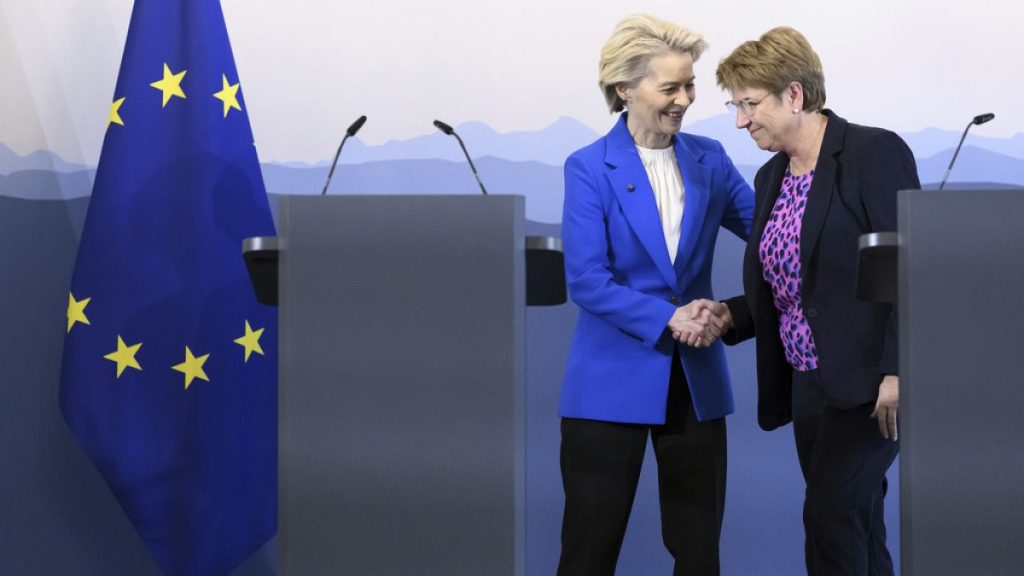The European Union and Switzerland have reached a landmark bilateral agreement, estimated to be worth €550 billion in trade, aiming to modernize and deepen their economic relationship. This comprehensive deal updates existing agreements on the free movement of people, transport, and agricultural trade, while also forging new ground in areas like electricity market integration and research collaboration. It represents a significant step towards integrating Switzerland more closely into the EU single market, offering both sides potential benefits in terms of economic growth and stability. Despite the fanfare surrounding the announcement, the agreement’s ratification is far from assured, particularly in Switzerland where public opinion remains divided on closer ties with the EU.
The agreement’s main thrust is to update and streamline existing bilateral agreements between the two entities. These agreements cover a wide range of areas, from the free movement of people to the trade of agricultural products. Modernizing these agreements is seen as crucial for maintaining the smooth flow of goods, services, and people across the border, which is essential for both economies. Beyond simply updating existing arrangements, the new deal breaks new ground by integrating Switzerland into the EU’s internal electricity market and granting Swiss researchers access to EU research programs like Horizon Europe. These additions signify a deepening of cooperation beyond traditional trade areas, fostering closer ties in strategic sectors.
Switzerland, a non-EU member, enjoys a unique relationship with the bloc, being the EU’s fourth-largest trading partner for goods and third-largest for services. The sheer volume of trade underscores the interconnectedness of the two economies and the importance of maintaining a strong and stable relationship. The agreement seeks to solidify this relationship by providing a more predictable and integrated framework for future economic cooperation. This includes provisions for Switzerland to contribute to EU cohesion funds, reflecting a greater level of shared commitment to economic development within the broader European context.
A key sticking point in the negotiations, and one that continues to be a source of potential controversy, is the safeguard clause. This clause, championed by Switzerland, allows either party to activate protective measures in the event of disproportionate economic consequences stemming from the agreement. The inclusion of this clause reflects Switzerland’s concerns about the potential impact of the agreement on its domestic economy, particularly regarding immigration. The mechanism for resolving disputes related to the safeguard clause involves an arbitration tribunal, offering a formalized process for addressing disagreements. As a counterpoint to the Swiss concession on the safeguard clause, the EU secured equal access for European students to Swiss universities, ensuring they pay the same fees as Swiss nationals.
The road to ratification is fraught with potential challenges, particularly in Switzerland. While the EU side appears confident in securing the necessary approvals from member states and the European Parliament, the situation in Switzerland is more complex. The agreement faces a dual hurdle: parliamentary approval and a mandatory referendum. Swiss public opinion towards the EU remains ambivalent, with a significant portion harboring skepticism about closer integration. This skepticism, fueled by concerns about immigration, sovereignty, and the potential impact on wages, creates a challenging political landscape.
The Swiss People’s Party (SVP), the largest political force in Switzerland, has already voiced strong opposition to the agreement, labeling it a “treaty of submission to the EU.” Their opposition centers on concerns about increased immigration, the influence of the EU Court of Justice, and the erosion of Swiss sovereignty. This opposition, combined with the general ambivalence towards the EU within the Swiss population, suggests a difficult battle ahead for proponents of the agreement. Even the Swiss Union of Trade Unions (USS), typically a supporter of closer ties with the EU, has adopted a cautious stance, citing concerns about the potential impact on wages. The USS’s decision to thoroughly examine the agreement before taking an official position further highlights the complexities and sensitivities surrounding the deal. The coming months will be crucial in determining the fate of the agreement, as both sides embark on the ratification process amidst a backdrop of political maneuvering and public debate.














